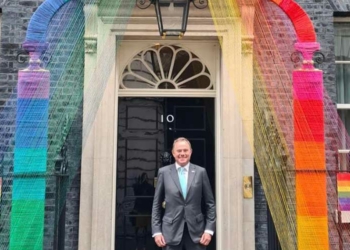In today’s linked piece, we share Carolyn Mason’s* distressing account of how her lesbian daughter, a gender-non-conforming teenager who had been subjected to homophobic bullying, decided to identify as “transgender” after a presentation was given at her school by a transgender-identified LGBTQ+ lobby representative.
As is the case with so many lesbian and gay children today, what Lucy* has experienced is a modern form of homophobic conversion therapy. The Government could prevent such harm by beefing up existing child safeguarding legislation, by banning gender ideology promotion from schools, and by ensuring this ban is enforced on pain of severe sanctions. Instead, the Government is initiating a rushed “conversion therapy” bill consultation that ends on 10 December. It is a completely unnecessary piece of legislation that is now an anachronism: a red-flag measure that is being pushed on to the statute books under pressure from gender activists such as Stonewall UK, Mermaids, and other LGBT+ lobby promoters.
The civil rights campaign group “Sex Matters”, which was set up “to undo the damage done [by gender ideology] to institutions across society, and secure everybody’s human rights” – have produced an excellent and detailed position paper setting out their ten key concerns about the Government’s “conversion therapy” bill proposal, and it is a paper that merits a very wide reading and dissemination: https://sex-matters.org/posts/sex/press-pause-on-conversion-therapy-law/
However good the intentions of Liz Truss may be – the Minister for Women and Equalities who is overseeing this legislation – we have here what appears to be her compromise deal aimed at assuaging a Conservative Party hierarchy that is still far too much in thrall to Stonewall UK and its ever-colonising, obsessive transgender ideology.
The cruel and ignorant history of conversion therapy, with its electric shocks and emetic injections, overwhelmingly belongs to lesbian and gay history: not to the history of transgender ideology or of any other minority group. Some people really are sexually attracted to members of the same sex: it is an empirical and verifiable fact. By contrast, no one is really the soul of one sex in the body of another.
Any “conversion therapy” ban legislation that refers to “LGBT” is necessarily an affront to the lesbian and gay identity and an appropriation of our unique history, as it force-teams lesbian and gay people with an ideology that seeks to erase our very identity by labelling “same-sex attraction” as a “transphobic” and “bigoted” violation of the “same-gender attraction” label it insists we adopt, and with an ideology that effectively attacks our right to say we are exclusively sexually attracted to people of the same sex.
It used to be the job of religious fundamentalists to condemn lesbian and gay people, and to deny us validation, when we disclosed our sexual orientation. Now the gender ideology fundamentalists have joined them – and to add insult to injury, the Government seems set on creating a new law that uses the very “LGBT” initialism whose last letter negates the first two, as though we were all in homogeneous agreement with our lesbian and gay identity and rights being erased – including our right even to meet, socialise and organise separately as lesbian and gay people.
Transgender identification has nothing to do with sexual orientation, and new slippery-slope pro-transgender legislation should never be allowed to ride into the statute books on the coattails of the historical lesbian and gay rights movement.
Lucy’s experience of social conversion therapy – an increasingly common experience of lesbian and gay teenagers in today’s obsessive identity politics culture – came about because of her youth, her lack of experience, and her vulnerability. However, there is a whole constituency of lesbian and gay adults and our friends, and of concerned parents seeing the propaganda-driven transitioning of their same-sex attracted children, who refuse to collude with the colonisation and revisionism of lesbian and gay history by transgender activists, and who refuse to see children manipulated in this cynical, mendacious, and heavy-handed way. Transgender identification has nothing to do with sexual orientation, and new slippery-slope pro-transgender legislation should never be allowed to ride into the statute books on the coattails of the historical lesbian and gay rights movement.
At the very least, the proposed bill will have a chilling effect on those who wish to support children – including many gay and lesbian children – who have become transgender-identified at the hands of their schools, peers, and Internet groomers. Therapists will be wary of saying anything that could be presented – or misrepresented – by politicised teenage clients who present as transgender-identified, as trying to steer them away from their transgender identity. The proposed legislation will also assist attempts further down the line by LGBTQ+ lobby groups to demand the criminalisation of anything but “gender-affirming therapy” for transgender-identified people, where the very paradigms of questioning one’s beliefs, and of embracing uncertainty, that underpin all healthy psychotherapeutic approaches, fall victim to cancel culture and coerced speech.
Liz Truss’s statement on the proposal indicates that it will become illegal for a therapist to encourage a person not to believe that she is a boy when she is a biological girl yet claims to be a boy, or a girl when he is a biological boy yet claims to be a girl. It will therefore, for the first time, become illegal for a therapist to encourage people to come to terms with immutable empirical facts when doing so could bring them insight, relief, healing, personal development, and into a closer relationship with reality.
Until recently, prior to the iconoclasm of identity politics, gender dysphoria was universally treated as a pathology: as something that was not good for the patient, and from which he or she needed help to recover. Now, it is to become illegal to do that. What comes next? Are we to make it illegal for a child who suffers from anorexia nervosa to be encouraged to understand that she is dangerously underweight when she wrongly believes she is fat? Is this really so far removed from making it illegal to encourage a girl not to have her breasts amputated because she is definitely not a boy, and may instead be lesbian, high-functioning autistic, gender-non-conforming, or simply traumatised and depressed?
What a dangerous precedent it sets to inhibit a clinician’s right and responsibility to identify unassailable biological facts when reckless, self-absorbed, political adults have set an immature same-sex-attracted child on a pathway of social transitioning, puberty blockers and cross-sex hormones … and even, potentially, surgical procedures. No wonder the gender lobby are pushing so hard for this legislation. For the first time, “gender identity” will be embedded in British law: a fake concept that only exists in people’s imaginations, that normalises a pathology and pseudo-identity, and that has no true empirical referent. This legislation will also bring about a further consolidation of the “LGBT” initialism, even though it is one that positively harms lesbian and gay people. It will furnish the slippery slope to more draconian legislation further down the line, as we can be sure that the LGBT+ lobby will never stop pushing for new legislation that panders to their insatiable mindset of perpetual victim identity and elite social status.
What a dangerous precedent it sets to inhibit a clinician’s right and responsibility to identify unassailable biological facts when reckless, self-absorbed, political adults have set an immature same-sex-attracted child on a pathway of social transitioning, puberty blockers and cross-sex hormones … and even, potentially, surgical procedures.
Many readers will not remember Section 28, which came into law under the Conservative government of Margaret Thatcher in 1988. Section 28 was a part of the Local Government Act 1988 that imposed a new obligation on local authorities: that they “shall not intentionally promote homosexuality or publish material with the intention of promoting homosexuality” or “promote the teaching in any maintained school of the acceptability of homosexuality as a pretended family relationship”.
There were no prosecutions under this Act, and it was local authorities that were caught by its ambit, rather than individual people. The legislation also only forbade the promotion of homosexuality, meaning the depiction of homosexuality as a positive phenomenon, rather than prohibiting any neutral reference to it. In fact, educational guidelines issued by the Thatcher government with regard to HIV prevention programmes in schools, which were mandatory, stated explicitly that nothing in the Section 28 legislation should be interpreted as preventing clear guidance about the routes of HIV transmission and how to prevent it. So, identification of unprotected anal sex among gay men putting them in a high-risk group for HIV transmission was certainly not intended to be inhibited by Section 28 legislation.
However, Section 28 had appallingly negative consequences that caused serious damage both to the well-being of lesbian and gay young people and to the Conservative Party itself. Despite the public face of the lesbian and gay rights constituency always having been overwhelmingly left-wing, the Conservatives underestimated how many of their own voters and members were lesbian and gay “shy” Conservatives, who lived quiet lives of assimilation and felt deeply resentful about this insult to their sexual orientation and intimate relationships. These gay Conservatives were alarmed at how Section 28 would increase the stigmatisation of lesbian and gay people and make it even more difficult for same-sex attracted teenagers to access the basic information they needed and deserved in coming to terms with their sexual orientation in a society that was still very markedly homophobic.
Added to this constituency of “shy” lesbian and gay Conservatives were all the friends and family members who loved them, as well as the many Conservative voters and members who regarded this legislation as an unwarranted attack on the Conservative values of individual freedom and of fairness to all.
Section 28 was a very bad move by the Conservative Party, and Margaret Thatcher had been unwise to cede to the religious campaigners who had lobbied her for it. Mrs Thatcher had been one of those who voted for the decriminalisation of homosexuality in 1967, when her instincts had clearly served her much better, and when most of her fellow Conservative MPs had voted against decriminalisation. Section 28 even led to speculation among the Left that Mrs Thatcher was preparing the ground to re-criminalise homosexuality further along the line: such was the level of profound mistrust and suspicion that her government brought upon itself as a result of this legislation.
The main harm caused by Section 28 was the climate of fear that it created. The teaching profession, for all its progressive posturing, conformed slavishly with this new injunction not to “promote” homosexuality. As nobody really knew what would be considered to constitute “promotion”, the legislation had a blanket chilling effect, and educators veered away from mentioning homosexuality at all, even in sex education classes. Despite the government’s apparent concern that Section 28 should not inhibit accurate HIV prevention information, the legislation certainly had a chilling effect in such health education programmes too, and may even have cost many lives.
In years to come, when the damage caused by their perhaps well-intentioned but certainly ill-advised legislation becomes apparent to the public, the Conservative Party could find itself harshly called to account for its second Section 28-style attack on the lesbian and gay community: an attack fuelled by ignorance, by a desire to appease gender lobby groups…
The Conservatives’ LGBT “conversion therapy” ban could easily become their new Section 28. As the case of teenager Lucy Mason* demonstrates, gender ideology promotion is homophobic conversion therapy by stealth. The proposal bears the clear hallmarks of yet another Section 28-style reckless miscalculation by the Conservative Party that will cause serious harm to current and future generations of lesbian and gay teenagers, who are already being subjected to a modern form of conversion therapy because the Government has allowed schools to be colonised by transgender ideology activists.
As more and more children are damaged by this ideology, both at school and in their psychotherapy sessions, and as more and more people become conscious of this damage whose existence is currently being suppressed by large sections of our media, corporate, and public institutions, there will eventually be a backlash against the Conservative Party from countless affected families, from countless voters concerned about child safeguarding and the protection of gay and lesbian people, and from countless hitherto loyal lesbian and gay supporters of the Conservative Party.
In years to come, when the damage caused by their perhaps well-intentioned but certainly ill-advised legislation becomes apparent to the public, the Conservative Party could find itself harshly called to account for its second Section 28-style attack on the lesbian and gay community: an attack fuelled by ignorance, by a desire to appease gender lobby groups, and by a desire to placate its own internal gender lobby colonisers. An attack that is rendered no less harmful by its status as an unintended consequence, given that the Government is being repeatedly warned not to go ahead with its plans.
Gender ideology promotion is homophobic conversion therapy by stealth. Whereas the promotion of gender ideology should be banned from all schools, and politicians should allow therapists to continue treating genuine gender dysphoria as the pathology that it is, the Conservative Party seems to be about to legitimise the claim of gender activists to an inalienable forced-teaming right with the lesbian and gay rights movement, and also to legitimise the absurd, harmful, unverifiable and completely meaningless claim that it really is possible to have the soul of one sex in the body of the other.
Like their original Section 28, this new, highly-camouflaged Section 28 trap, into which the Conservatives are unwisely allowing themselves to be strong-armed, is likely to cause them severe reputational damage among their voter base.
It is an irony that the new “conversion therapy” bill may be an attempt by the Conservative Party to make amends for the harm caused by its Section 28 legislation in 1988. It is this very bill, however, that threatens to backfire on the Conservatives as their new Section 28 moment, for which the electorate will make them pay dearly. Like their original Section 28, this new, highly-camouflaged Section 28 trap, into which the Conservatives are unwisely allowing themselves to be strong-armed, is likely to cause them severe reputational damage among their voter base.
This is yet another poisonous fruit borne of forced teaming between sexual orientation rights and gender ideology demands: two concepts that are completely irreconcilable, and whose relationship in modern society is characterised by increasing homophobic colonisation of the former by the latter, cheered on by the same amoral educational establishment that completely sold out on gay rights once before, in its servile, silent, and self-seeking deference to social prejudices and to Section 28.
Gary Powell is a gay man and has been active in gay politics since 1980. He is the Research Fellow for Sexual Orientation and Gender Identity at the Bow Group and the European Special Consultant to the Center for Bioethics and Culture.
*Name changed
























Comments
No comments yet, be the first to leave a comment.